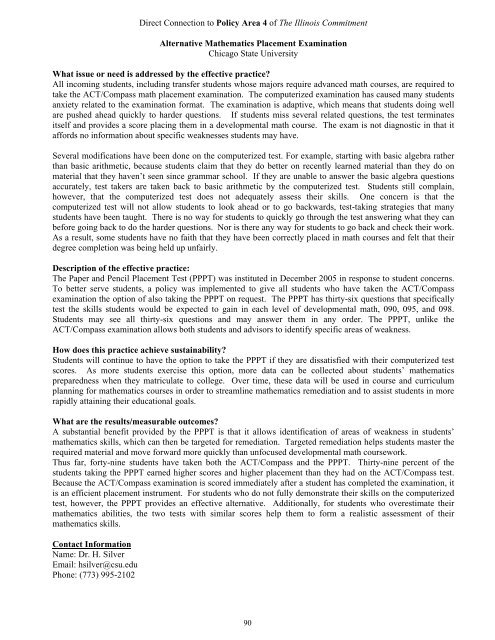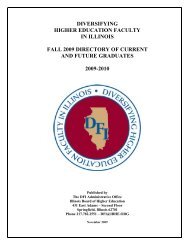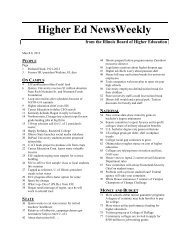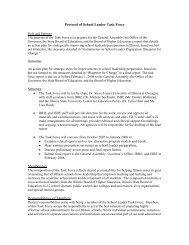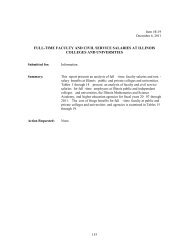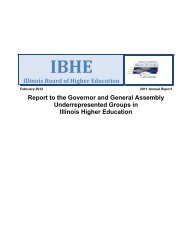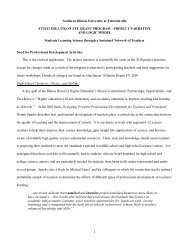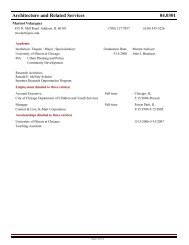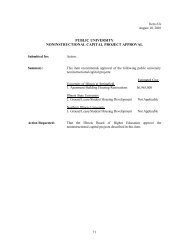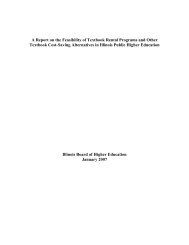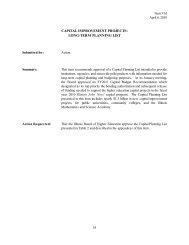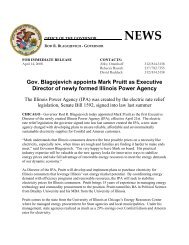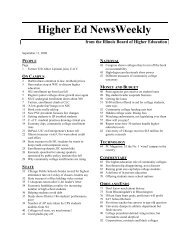Title of Effective Practice: - California Postsecondary Education ...
Title of Effective Practice: - California Postsecondary Education ...
Title of Effective Practice: - California Postsecondary Education ...
You also want an ePaper? Increase the reach of your titles
YUMPU automatically turns print PDFs into web optimized ePapers that Google loves.
Direct Connection to Policy Area 4 <strong>of</strong> The Illinois Commitment<br />
Alternative Mathematics Placement Examination<br />
Chicago State University<br />
What issue or need is addressed by the effective practice?<br />
All incoming students, including transfer students whose majors require advanced math courses, are required to<br />
take the ACT/Compass math placement examination. The computerized examination has caused many students<br />
anxiety related to the examination format. The examination is adaptive, which means that students doing well<br />
are pushed ahead quickly to harder questions. If students miss several related questions, the test terminates<br />
itself and provides a score placing them in a developmental math course. The exam is not diagnostic in that it<br />
affords no information about specific weaknesses students may have.<br />
Several modifications have been done on the computerized test. For example, starting with basic algebra rather<br />
than basic arithmetic, because students claim that they do better on recently learned material than they do on<br />
material that they haven’t seen since grammar school. If they are unable to answer the basic algebra questions<br />
accurately, test takers are taken back to basic arithmetic by the computerized test. Students still complain,<br />
however, that the computerized test does not adequately assess their skills. One concern is that the<br />
computerized test will not allow students to look ahead or to go backwards, test-taking strategies that many<br />
students have been taught. There is no way for students to quickly go through the test answering what they can<br />
before going back to do the harder questions. Nor is there any way for students to go back and check their work.<br />
As a result, some students have no faith that they have been correctly placed in math courses and felt that their<br />
degree completion was being held up unfairly.<br />
Description <strong>of</strong> the effective practice:<br />
The Paper and Pencil Placement Test (PPPT) was instituted in December 2005 in response to student concerns.<br />
To better serve students, a policy was implemented to give all students who have taken the ACT/Compass<br />
examination the option <strong>of</strong> also taking the PPPT on request. The PPPT has thirty-six questions that specifically<br />
test the skills students would be expected to gain in each level <strong>of</strong> developmental math, 090, 095, and 098.<br />
Students may see all thirty-six questions and may answer them in any order. The PPPT, unlike the<br />
ACT/Compass examination allows both students and advisors to identify specific areas <strong>of</strong> weakness.<br />
How does this practice achieve sustainability?<br />
Students will continue to have the option to take the PPPT if they are dissatisfied with their computerized test<br />
scores. As more students exercise this option, more data can be collected about students’ mathematics<br />
preparedness when they matriculate to college. Over time, these data will be used in course and curriculum<br />
planning for mathematics courses in order to streamline mathematics remediation and to assist students in more<br />
rapidly attaining their educational goals.<br />
What are the results/measurable outcomes?<br />
A substantial benefit provided by the PPPT is that it allows identification <strong>of</strong> areas <strong>of</strong> weakness in students’<br />
mathematics skills, which can then be targeted for remediation. Targeted remediation helps students master the<br />
required material and move forward more quickly than unfocused developmental math coursework.<br />
Thus far, forty-nine students have taken both the ACT/Compass and the PPPT. Thirty-nine percent <strong>of</strong> the<br />
students taking the PPPT earned higher scores and higher placement than they had on the ACT/Compass test.<br />
Because the ACT/Compass examination is scored immediately after a student has completed the examination, it<br />
is an efficient placement instrument. For students who do not fully demonstrate their skills on the computerized<br />
test, however, the PPPT provides an effective alternative. Additionally, for students who overestimate their<br />
mathematics abilities, the two tests with similar scores help them to form a realistic assessment <strong>of</strong> their<br />
mathematics skills.<br />
Contact Information<br />
Name: Dr. H. Silver<br />
Email: hsilver@csu.edu<br />
Phone: (773) 995-2102<br />
90


